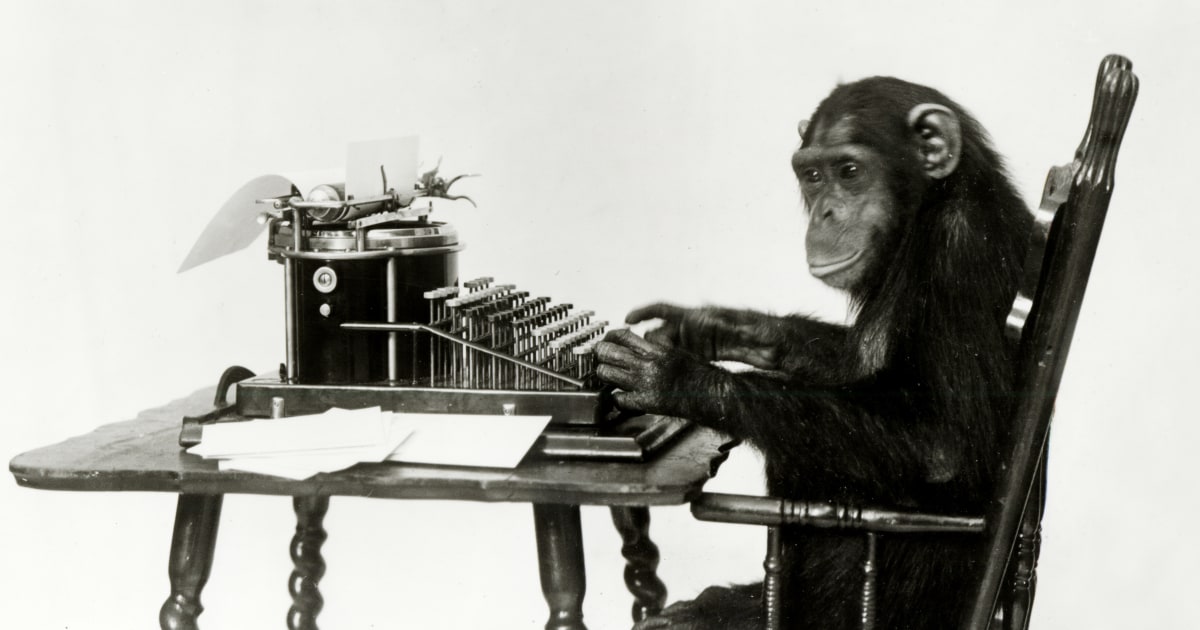A monkey couldn’t write Shakespeare before the universe dies, new study finds
It’s a staple of popular fiction, but two mathematicians in Australia now say that an age-old maxim is nothing more than bananas.
The Infinite Monkey Theorem hypothesizes that, given a typewriter and an infinite amount of time, a monkey could in theory produce the full works of William Shakespeare. It has long been used to illustrate the idea of random chance, and featured in everything from ‘The Simpsons” to “A Hitchhiker’s Guide to the Galaxy.”
Now, two academics at the University of Technology Sydney have written a paper in which they claim that even if all the world’s simians were working around the clock to replicate works such as “Hamlet,” the universe would almost certainly die before they had a chance to pose the bard’s famous question, “to be or not to be.”
The study is published in the December edition of the peer-reviewed Franklin Open journal.
“It’s one of those examples where the mathematical concept of infinity gives you a result which is grossly misleading in the real world,” Stephen Woodcock, an associate professor at the university’s School of Mathematical and Physical Sciences and one of the paper’s authors, told NBC News.
“We took some fairly generous assumptions about the typing efficiency of a monkey with a fairly generous assumption by how quickly they could type,” he said in a phone interview Friday.
“And even being as generous as that, once you work it out to the likely age of the universe, it’s not just that it probably won’t happen — the chance of it happening is just orders of magnitude out,” he added.
The paper uses the “heat death” theory for the end of the universe, which involves the sun swallowing the Earth in a googol of years — one followed by 100 zeros.
That said, by including a time limit — even the largest one thought possible — some may argue the mathematicians have missed the point of the “infinite” theory.
Woodcock, who wrote the paper with his colleague Jay Falletta, explained that the two worked on the understanding that if an ape or a baboon were given a 30-character keyboard containing the alphabet and some basic punctuation, there is roughly a 5% chance that one monkey could type the word “bananas” in its lifetime.
According to Open Source Shakespeare, a web page containing all of the bard’s plays, poems and sonnets, there are 884,421 words in the entire works of Shakespeare. While the Shakespeare Birthplace Trust says the writer introduced more than 1,700 words into the English language, “banana” was not one of them.
The chances of a chimpanzee managing to produce a short phrase such as “I chimp therefore I am” were much slimmer, at 1 in 10 million billion billion, the research said. The whole global population of macaques wouldn’t stand much more chance.
“By the time you hit even a short book,” Woodcock explained — the paper uses the example of Curious George — “the chance of this happening before the entire universe ends is basically as good as zero.”
Despite the theorem being such a common part of popular theoretical physics, Woodcock said he was “surprised” to find that nobody had formally claimed to have debunked the theory before him.
Other academics were less incredulous, suggesting that the paper was a wild goose chase — a phrase itself invented by Shakespeare.
“Every mathematician in the world knows this,” Ian Stewart, emeritus professor of mathematics at Warwick University, said in an email.
“It certainly didn’t need debunking. It’s something everyone has known forever,” Martin Hairer, professor of mathematics at Imperial College London, said in a phone call. “The universe could die and be reborn millions and millions of times and it still wouldn’t happen.”
That’s the theory.
Getting a bonobo or a chimpanzee to whip up “Macbeth” might be even less likely in practice, according to the head keeper at the London Zoo.
“If you were to give a keyboard or a typewriter to a gorilla at the London Zoo, I’d say ‘good luck getting it back’ because they’d smash it to pieces or try to eat it,” said Daniel Simmonds, who is the zoo’s Zoological Operations Manager.
Simmonds, who was a gorilla keeper for 17 years, added that gorillas in particular are “at the top of the tree” among the great apes when it comes to cognitive understanding and emotional intelligence. But, he conceded, even the most intelligent gorilla he’s worked with, a female named Zaire who has since died from old age, would be unlikely to produce “A Midsummer Night’s Dream.”
It may be time for the theorem to exit popular usage — pursued, unsuccessfully, by a monkey.


